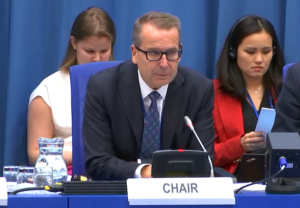Presentation by Commander Robert Forsyth RN (Ret’d) to the international webinar: “Nuclear Risk Reduction and Disarmament: Is it time for no-first-use policies in the USA and globally?”, April 29, 2021
I am a former Royal Navy nuclear submarine commanding officer who, in the 1970s, served in a UK Polaris submarine with responsibility for the ‘permission to fire key’ which would have launched 48 300kt warheads.
I did so on the understanding that we would only be ordered to do so as a counter-attack – 2nd strike – against an incoming nuclear weapon attack by the Soviets. I would have withheld permission if I had any reason to think we were being ordered to launch a first strike. I was not prepared, under any circumstance, to start a nuclear war based on an intelligence assessment that the Soviets might be on the point of launching a nuclear attack.
Intelligence can be fatally flawed, or wide open to misinterpretation or be straightforward prejudiced manipulation – as the 2003 US-UK invasion of Iraq showed all too clearly. Fortunately, UK Secretary of State for Defence’s pre-war assertion that nuclear weapons might be used to counter Saddam Hussein launching a chemical or biological weapon attack was not acted upon.
In the run-up to the 2016 Trident submarine replacement debate in the UK Parliament, I questioned the cost and utility of Trident missiles in this post-Cold War world. I was also concerned that this ignored the UK’s commitment to Article 6 of the Non-Proliferation Treaty. The NPT’s entry into force in 1970 – two years before I went on my first Polaris patrol – had encouraged me to think that the doctrine of Mutually Assured Destruction (M.A.D.) was indeed so mad that, within my lifetime, nuclear weapons would become the dinosaurs they deserved to be. How wrong I was.
So it was quite a shock for me to discover five years ago that First Use had, secretly, always been part of UK planning but had not been declared either to us at sea or to the nation. We were all under the false impression that Polaris was solely a counter-strike weapon. And still today, hiding in plain sight – but camouflaged behind the comfort blanket phrase ‘weapons of last resort’ – is the fact that the UK’s policy of ‘strategic ambiguity’ – as it is now called – could still include a First Strike as a ‘last resort’ if our conventional forces are in danger of being over-run.
This ambiguity places current UK Trident submarine Commanding Officers in an impossible position. If nothing is ruled out, then everything, including First Use, can be ruled in. However, submerged on patrol, they will have no way of knowing why they are being ordered to fire, what the target is, or the consequences on civil populations of doing so. They therefore cannot make the legal and moral judgements that the Nuremberg Principles require them to do. They will not know if they are carrying out a superior’s order to commit a war crime. They must completely trust in their Prime Minister who, uniquely among nuclear weapon States, has the sole authority for a decision to fire with no military or third party approval required.
Interestingly, another former Royal Navy submarine captain recently stated ‘I would not press the button for Boris’ – why? Because he said he did not trust Prime Minister Boris Johnson’s judgment. Similar reservations were expressed by senior US military during President Trump’s time in office.
I therefore fully support examining whether now is the right time to press for a global No-First-Use policy. Much as I applaud and support the Treaty on the Prohibition of Nuclear Weapons, which entered into force recently, the reality is that it is not likely to be observed by the nuclear weapon states. But it may well apply such pressure on them that they feel the need to concede some relaxation of threat posture – such as No-First-Use – if only to show some compliance with NPT Article 6.
However, a big obstacle to overcome is that the nuclear weapon States justify possession of their weapons and the lawfulness of First Use by referring to the International Court of Justice 1996 Advisory Opinion which, by a casting vote, could not conclude whether or not the threat or use of nuclear weapons would be lawful if the very existence of a State was threatened; although it did decide that the threat or use of nuclear weapons would ‘generally’ be unlawful .
Similarly, the 1977 conference chaired by the International Committee of the Red Cross that negotiated Protocol 1 to the Geneva Conventions acceded to the nuclear weapon States’ insistence that the Protocol should not ‘name and shame’ any specific weapons. This enabled the UK to include in its Military Law handbook that the use of nuclear weapons was not prohibited by the Protocol: a factually correct conclusion but speciously achieved.
I therefore wonder if the UN General Assembly could be prevailed upon to frame a more specific request for the ICJ, and also perhaps for the ICRC, for an Advisory Opinion on whether there are any circumstances in which First Use – or even the threat of First Use – of nuclear weapons would be lawful? The danger of course is that, if First Use is deemed unlawful, it may seem to justify their use (or threat of this) for a counter strike. But this may be a temporary price worth paying.
In parallel, let us also consistently remind those States not signed up to the NPT that nuclear ‘comfort blankets’ provide no comfort at all. For every £ or $ put towards funding a nuclear armoury that is already more than big enough to end the world, they are a £ or $ further away from being equipped to defend against far more immediate modern day threats.
Lastly, we must all applaud the actions of the US Democratic party which has introduced two very important Bills into Congress; one to cancel the sea launched nuclear cruise missile programme and, of great relevance to this webinar, one to adopt a policy of No First Use. Where the USA leads others may follow.
Links:




